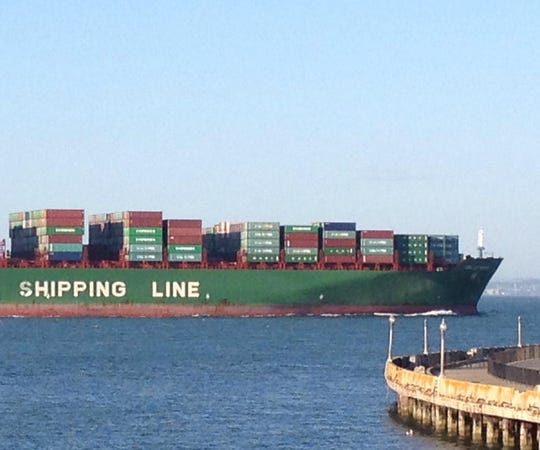Artificial intelligence works its way into supply chains

Adding artificial intelligence to supply chains is delivering tangible benefits for companies putting it in place. Recent research out of McKinsey finds 61% of executives report decreased costs and 53% report increased revenues as a direct result of introducing artificial intelligence into their supply chains. More than one-third report a revenue bounce exceeding five percent. Areas generating revenue in supply chain management include sales and demand, forecasting, spend analytics, and logistics network optimization.
SEE: 5G: What it means for IoT (ZDNet/TechRepublic special feature) | Download the free PDF version (TechRepublic)

Sounds good. So what's standing in the way of getting more AI into supply chain management systems? I ran this question past Arnaud Morvan, senior engagement director at Aera Technology, a company that focuses on AI. "A reliance on obsolete legacy technologies creates a great deal of time-consuming and error-prone manual work for supply chain practitioners," Morvan points out. "They often spend about 50% of their time collecting and crunching numbers from disparate global systems. That adds weeks or months of delay to core processes that need to run faster to keep up with market demand."
Increasing complexity in supply chain IT infrastructure "makes it difficult to achieve the speed and agility that's required in today's markets," Morvan adds. "With globalization, it's common for large companies to operate hundreds of sourcing, production and distribution systems around the world, both internally and with partners."
Today's supply chains look a lot different than just a few years ago, and they continue to evolve in a fiercely competitive economy. The latest innovations include "the creation of pop-up warehouses, ship-from-store models and other speed-oriented innovations," he says. "And supply chains are challenged to effectively manage growing product portfolios that can include many thousands of SKUs. SKU volumes continue to rise as companies strive to meet customer expectations for multiple sizes, colors and other variations in product configurations."
AI can help keep enterprises on top of these shifts. Morvan calls the type of AI best suited for supply chain management as "cognitive automation," which is essentially extremely scalable AI that can "process terabytes or even petabytes of data." Such a platform can execute "thousands of Google-like data crawls a day across any number of internal or external systems, then aggregates and normalizes that data in what's called a cognitive data layer. There, AI and ML algorithms are applied to produce recommendations on optimal actions to improve supply chain speed and cost-efficiency," he states. "In effect, cognitive automation takes over the slow, difficult and unscalable data collection and analytic work traditionally done by human supply chain practitioners, often in Excel spreadsheets."
An example of AI or cognitive automation in the supply chain would be a pharmaceutical and medical device company that uses the technology for "available-to-promise (ATP)" metrics. "ATP availability -- the ability to provide a delivery date to a customer -- can potentially rise from 50% to close to more than 90%." This is made possible through "end-to-end visibility of global demand and supply by collecting and processing data across multiple systems in real time." It can also serve to "predict lead times through machine learning required for accurate ATP dates and quantities, especially important for back orders." In addition, AI-enhanced supply chains can "monitor near real-time changes of supply and demand that could impact ATP dates and quantity," as well as "recommend prescriptive actions to prevent impacts on ATP dates and quantities."
Morvan provides four advantages to applying AI -- or cognitive automation -- for meeting today's supply chain challenges:
End-to-end visibility. In today's complex networks of supply chains, "a cognitive automation platform addresses the challenge with constant data crawls across applications to create a single, virtualized data layer," he explains. "That layer reveals cause and effect, bottlenecks and opportunities for improvement. And it operates with near real-time data, rather than information that may be days, weeks or even months old."
Actionable analytic insights. :"Despite investing millions of dollars in data lake and business intelligence solutions, companies still don't have the insights required to make decisions in a timely manner to meet expectations for greater speed and agility," says Morvan. "Cognitive automation can sift through large amounts of information to discern patterns and quantify tradeoffs at a scale far beyond what's possible with conventional systems."
Reduce manual human work. "Supply chain professionals spend countless hours gathering data from disparate systems and utilizing BI tools or spreadsheets to devise plans. It's an increasingly difficult task," says Morvan. "There's simply too much data, too many applications and too many variables to account for. Cognitive automation takes over the heavy lifting traditionally done by humans. It delivers deep analysis down to the SKU level, not practical with a manual approach."
Informed decision-making. "Cognitive automation automates and augments decisions with AI-driven predictions and recommendations on optimal actions to improve supply chain performance," says Morvan. "It will spell out implications across various scenarios in terms of time, cost and revenue. A cognitive automation platform can also be authorized to act autonomously. And by learning over time, it continuously improves recommendations as conditions change."